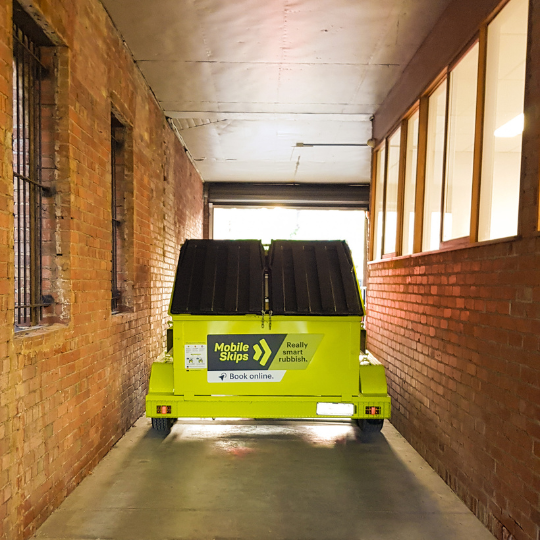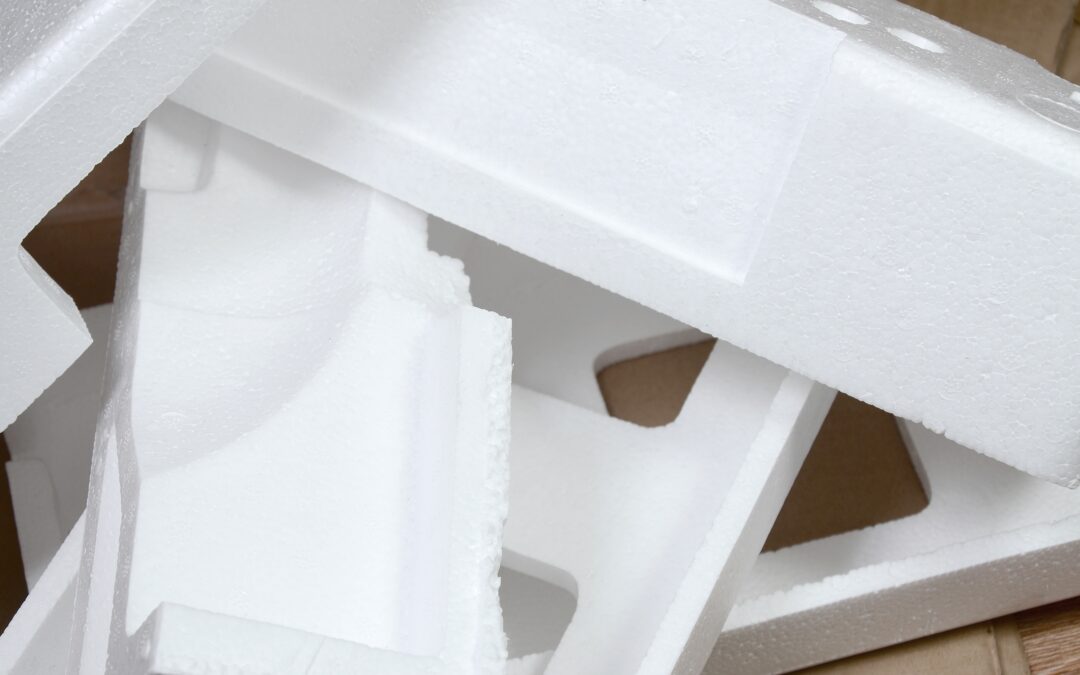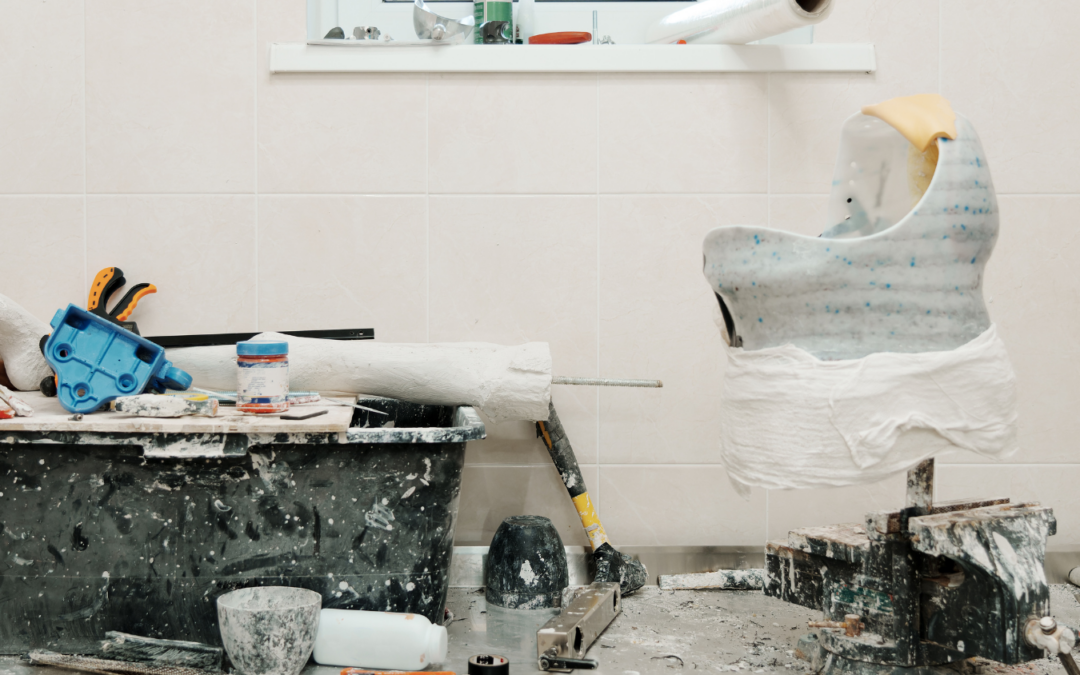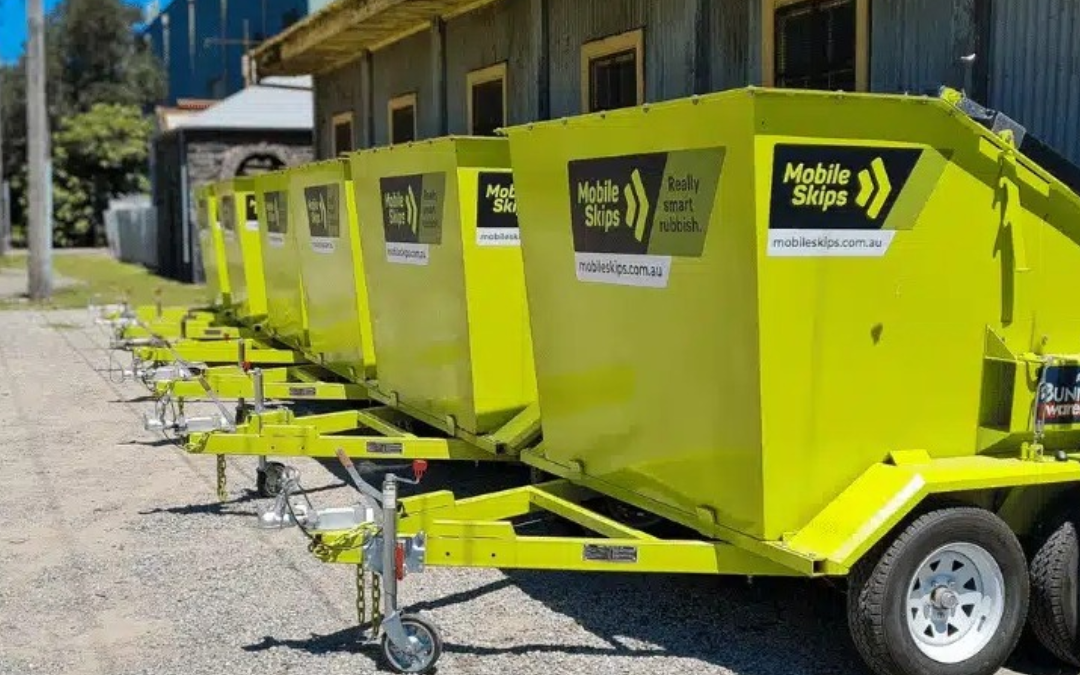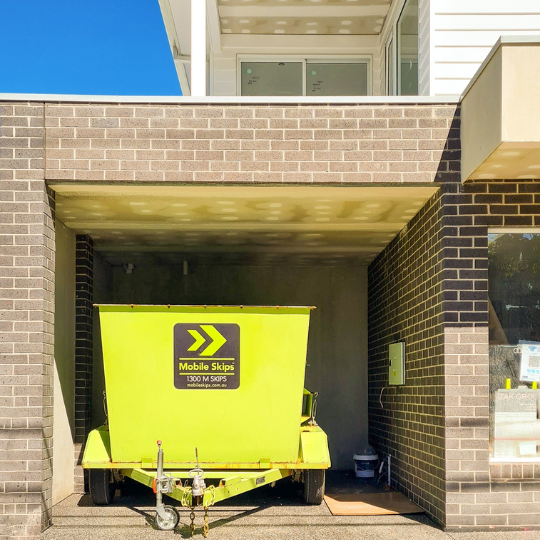Why Is Waste Management Challenging in Tight Spaces?
Renovating homes in urban or suburban areas often means dealing with limited space for waste disposal. Whether it’s a narrow driveway or limited street access, proper waste management in tight spaces is crucial to keeping your renovation on schedule and minimising disruption to neighbours – Mobile Skips.
When managing home renovation waste, some common challenges are:
- Limited Space: Urban and suburban homes often have narrow driveways or small yards, making it tough to place and manoeuvre traditional skip bins.
- Street Access: Limited street access can hinder the placement and pickup of large skips, disrupting schedules and causing inconvenience.
- Neighbour Disruption: Improper waste management can block access to neighbouring properties, creating conflicts and disturbances (Arrowaste).
Using Mobile Skips can alleviate these difficulties. These compact skips are designed to fit into small areas, eliminating the need for council permits and simplifying delivery and pickup.
For personalised advice on handling renovation debris in confined areas, explore our tips on demolition waste and flooring and carpet removals.
How Mobile Skips Make Waste Removal Easy in Tight Spaces
Mobile Skips offer practical solutions for removing renovation waste in confined areas. Here’s how they make the process straightforward and efficient:
Compact Size for Narrow Areas
What It Means: Mobile Skips’ 4 cubic metre bins are designed to fit into small areas like driveways, alleyways, and tight urban streets.
Tip: If you have limited space, Mobile Skips can be placed where traditional skips won’t fit, providing a practical waste solution without blocking the street or occupying too much space.
No Council Permits Required
What It Means: Mobile Skips don’t require council permits, unlike larger skips that may need approval if placed on the road.
Tip: Skip the hassle of paperwork by using Mobile Skips on your property, making it easier to start your renovation project without delays. This is particularly useful for home renovation waste.
Easy Delivery and Pickup
What It Means: Mobile Skips are delivered and picked up on your schedule, ensuring you can keep your workspace clear without having to store waste for long periods.
Tip: Schedule your bin delivery when demolition begins and arrange for regular pickups if needed, especially for projects in confined spaces. This helps to manage your demolition waste efficiently.
| Mobile Skips Benefits | Description |
|---|---|
| Compact Size | Fit into small areas like driveways and alleyways |
| No Permits Needed | Avoid council paperwork by using them on your property |
| Flexible Scheduling | Delivery and pickup on your terms |
Additional Information
- Mobile Skips bins do not accept dangerous materials such as asbestos, chemicals, poisons, batteries, paint, food, or biological waste (Mobile Skips).
- The skip bins have a weight capacity of up to 1000k g for Heavy Skip bins and 500kg for Standard Skip bins (Mobile Skips).
- Mobile Skips partners with the St Vincent de Paul Society in Melbourne for re-homing household goods through a donation collection program.
For more details on handling waste during your renovation project, check out our articles on kitchen renovation waste, bathroom renovation waste, and sustainable waste removal.
Best Practices for Managing Waste in Tight Spaces
Effectively managing waste in confined areas during your home renovation requires smart strategies to ensure you can work efficiently without clutter. Below are some of the best practices to help you manage waste in tight spaces.
Break Down Large Items Before Disposal
Breaking down large items into smaller pieces can significantly maximize space in your skip bin. Items such as wood, drywall, old cabinets, and tiles should be dismantled before disposal.
| Item Type | Tip |
|---|---|
| Wood | Cut into smaller pieces |
| Drywall | Break into manageable sections |
| Old Cabinets | Disassemble to reduce bulk |
| Tiles | Remove and stack neatly in smaller piles |
Stack Waste Efficiently
Efficiently stacking your renovation waste ensures you utilize every inch of space inside your skip. Place heavy items like tiles or bricks at the bottom and lighter debris on top to prevent overloading.
| Waste Type | Best Stacking Method |
|---|---|
| Flooring Materials | Lay flat and stack neatly |
| Fixtures | Arrange in layers, heavier at the bottom |
| Drywall | Stack vertically to maximize bin height |
| Debris | Fill gaps and cover lighter materials |
For more tips on managing kitchen renovation waste and bathroom renovation waste, ensure you visit our related articles.
Use Multiple Skips for Larger Projects
For larger renovation projects with limited space, consider using multiple Mobile Skips instead of one large bin. This approach helps prevent waste from piling up and obstructing your workspace.
| Skip Type | Suitable Usage |
|---|---|
| Standard Skip Bin | 1 wheelbarrow of heavy stuff, ideal for small tasks |
| Heavy Skip Bin | 5 wheelbarrows of heavy stuff, suitable for larger loads |
Tip:
Schedule regular pickups to ensure waste does not accumulate and disrupt your renovation workflow. Booking your Mobile Skip in advance and planning multiple collections can help you maintain a clean and organized work environment throughout your project.
By implementing these best practices, you can effectively manage your renovation waste even in the tightest of spaces. For additional guidance, explore more resources on renovation clean up and specific tips for roofing renovation waste.
What Types of Waste Can Go in Mobile Skips for Tight Spaces?
Renovation Debris
Accepted: Wood, drywall, plasterboard, flooring, and tiles
Tip: Separate recyclable materials like wood and metal from general waste to make disposal more eco-friendly and efficient. For more guidelines, see our renovation waste page.
Mobile Skips are well-suited for disposing of renovation debris, including wood, drywall, plasterboard, flooring, and tiles. This makes them perfect for a variety of projects, from kitchen renovations to complete room makeovers.
Old Fixtures and Fittings
Accepted: Cabinets, shelves, sinks, light fixtures
Tip: Dismantle bulky items to fit them more easily into the skip bin, ensuring you get the most out of the available space. Avoid dangerous materials such as asbestos, chemicals, poisons, batteries, paint, food, or biological waste (Mobile Skips).
When removing old fixtures, ensuring you dismantle bulky items like cabinets and sinks helps maximize space in your skip bin. This strategy is particularly useful for projects like bathroom renovations.
Light Construction Materials
Accepted: Bricks, metal, small amounts of concrete
Tip: For heavier materials like bricks and concrete, limit the amount you dispose of to avoid overloading. For larger volumes, consider alternate disposal methods or larger bins.
Mobile Skips can handle a range of light construction materials, including bricks, metal, and small amounts of concrete. For substantial amounts, such as more than 5 wheelbarrows of heavy materials, you may need a larger bin or more frequent pickups. All waste is sorted and weighed before being transported to registered recycling centres daily, contributing to sustainable waste removal (Mobile Skips).
| Waste Type | Accepted Materials | Tips |
|---|---|---|
| Renovation Debris | Wood, drywall, plasterboard, flooring, tiles | Separate recyclable materials like wood and metal |
| Old Fixtures and Fittings | Cabinets, shelves, sinks, light fixtures | Dismantle bulky items to maximise space |
| Light Construction | Bricks, metal, small amounts of concrete | Limit disposal to avoid overloading |
For more comprehensive insights into managing specific types of renovation waste, such as flooring and carpet removals and roofing renovation waste, refer to our specialized guides. Proper waste management in tight spaces not only helps you stay organized but also supports eco-friendly disposal practices.
When a Mobile Skip May Not Be Suitable for Tight Space Renovations
Excessive Heavy Waste
Dealing with large quantities of heavy waste, such as bricks, concrete, or soil, can be particularly challenging in tight spaces. While Mobile Skips offer convenient solutions for various renovation projects, there are scenarios where they might not be the best choice.
What It Includes: Large amounts of bricks, concrete, or soil
Mobile Skips can handle a moderate amount of heavy materials, but if your renovation project generates excessive heavy waste, you may need to reconsider your waste disposal options. For instance, a Standard Skip Bin accepts up to 1 wheelbarrow of heavy materials, whereas a Heavy Skip Bin can accommodate up to 5 wheelbarrows (Mobile Skips). Exceeding these limits can lead to issues such as overloading, unsafe transportation, and additional fees.
| Skip Bin Type | Capacity |
|---|---|
| Standard Skip Bin | Up to 1 wheelbarrow of heavy materials (500kg) |
| Heavy Skip Bin | Up to 5 wheelbarrows of heavy materials (1000kg) |
Why It Matters: Mobile Skips can handle a moderate amount of heavy materials, but if you’re dealing with more than 5 wheelbarrows of concrete or bricks, you may need a larger skip bin designed for heavy loads.
Handling heavy waste correctly is essential to prevent environmental damage. Improper disposal can lead to pollution, resulting in contamination of water, soil, and air, and harming marine life.
Tip: If your project generates excessive heavy waste, consider hiring a larger bin or scheduling more frequent pickups to avoid overloading.
For large renovation projects, such as home renovation waste, managing waste efficiently ensures that your workspace remains clutter-free, and your project stays on track. Consider using multiple skips in conjunction with larger bins to keep your site organised and environmentally friendly. For more information on specific waste considerations, you can refer to articles on renovation waste, kitchen renovation waste, and bathroom renovation.
In summary, excessive heavy waste may require alternative solutions beyond Mobile Skips, ensuring a practical and safe renovation process. Plan accordingly to manage your waste without causing disruptions in tight spaces.
Safety Tips for Waste Removal in Tight Spaces
For efficient removing renovation waste, especially in confined areas, it’s crucial to follow certain safety tips to ensure a smooth and hazard-free process. Here are some key considerations:
Ensure Safe Access to the Skip Bin
Why It’s Important
Confined spaces can make maneuvering difficult, so it’s crucial to ensure there’s clear access to and from the skip bin for safe loading (Arrowaste).
Tip
- Keep pathways clear: Ensure that the route to the skip bin is free from obstacles to avoid accidents.
- Avoid stacking waste too high: Prevent overloading by maintaining a manageable height, especially if the skip is in a narrow area.
Avoid Overloading the Bin
Why It’s Important
Overloading can lead to unsafe transportation and additional fees. Ensuring the bin is not overloaded is particularly vital in tight spaces where maneuverability can be a challenge.
Tip
- Stick to the fill line: Always observe the maximum fill line indicated on your skip bin.
- Evenly distribute weight: Distribute waste evenly inside the skip to facilitate safe removal and handling.
Plan for Regular Waste Removal
Why It’s Important
In small spaces, waste can quickly accumulate and obstruct your workspace. This makes scheduling regular pickups essential to keep your renovation project on track (Arrowaste).
Tip
- Schedule regular pickups: Arrange for waste removal at regular intervals to prevent clutter.
- Keep workspace organized: Maintaining a clean and organized workspace will help in mitigating risks and ensuring project efficiency.
By following these safety tips, you can make the process of removing renovation waste efficient and safe. For more best practices, explore our guide on renovation clean up, and stay informed about managing different types of waste, whether it be kitchen renovation waste or bathroom renovation waste.
One Last Tip: Plan Ahead for Tight Space Renovations
Managing waste in tight spaces requires careful planning to avoid clutter and delays.
When it comes to removing renovation waste in tight spaces, having a strategy is essential. Proper planning ensures that your workspace remains organised and functional throughout the project.
Pro Tip: Book your Mobile Skip in advance and schedule multiple pickups to prevent your work area from becoming overwhelmed with debris. This ensures a cleaner, safer environment and allows you to focus on the renovation.
Consider the size and scope of your renovation project, whether it’s a kitchen renovation or bathroom renovation. Booking your Mobile Skip ahead of time allows you to choose the best options for your specific needs, ensuring that you’re prepared to manage any waste generated.
Additionally, scheduling multiple pickups can help keep your tight space organized. This approach allows you to continuously clear out debris, making it easier to maintain a safe and efficient workspace.
By planning ahead and managing waste effectively, you can avoid common pitfalls associated with waste accumulation in confined areas. For more tips and best practices on managing home renovation waste, explore our comprehensive guides and resources.
Final Thoughts on Removing Renovation Waste in Tight Spaces
Renovating homes in tight spaces doesn’t have to be stressful. With the compact size and flexible scheduling of Mobile Skips, you can efficiently manage your waste without taking up valuable space. Plan ahead, stay organized, and keep your project running smoothly with these best practices for waste removal in confined areas.
Using Mobile Skips means you won’t need council permits, which simplifies the process. Their 4 cubic metre bins are designed to fit into small areas like driveways, alleyways, and tight urban streets, making them ideal for renovations in urban settings. Additionally, Mobile Skips offer a fixed-price skip bin service with no hidden fees, ensuring transparency and ease of use for removing home renovation waste.
To make the most of the available space, break down large items like wood, drywall, and old cabinets before disposal. Stack materials neatly in the bin, placing heavier items like tiles and bricks at the bottom and lighter debris on top. For larger projects with limited space, consider using multiple Mobile Skips and scheduling regular pickups to efficiently manage the waste and maintain a clear workspace.
By following these tips and utilizing Mobile Skips, you can minimise disruptions to neighbors and keep your project on schedule. From kitchen renovation waste to bathroom renovation waste, effective waste management in tight spaces is achievable with careful planning and the right tools.
Discover more about managing renovation waste in tight spaces and other diy renovation projects to ensure a smooth and successful renovation experience.

